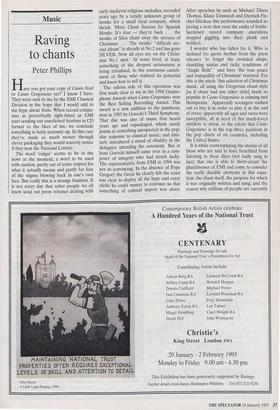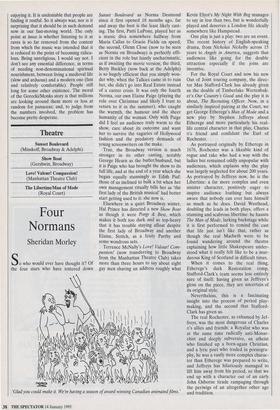Music
Raving to chants
Peter Phillips
. lave you got your copy of Canto Noel or Canto Gregoriano yet? I know I have. They were sent to me by the EMI Classical Division in the hope that I would add to the hype about them. When record compa- nies as proverbially tight-fisted as EMI start sending out unsolicited freebies in CD format to the likes of me, we conclude something is fairly seriously up. In this case they've made so much money through clever packaging they would scarcely notice if they won the National Lottery.
The word 'vulgar' seems to be in the news at the moment; a word to be used with caution, partly out of some respect for what it actually means and partly for fear of the stigma blowing back in one's own face. But really this is a strange business. It is not every day that sober people we all know, send out press releases dealing with early medieval religious melodies, recorded years ago by a totally unknown group of monks for a small local company, which shriek: 'More Chant Success for Spanish Monks: It's true — they're back . . . the monks of Silos chant away the stresses of Christmas . . . The monks' "difficult sec- ond album" is already at No.2 and has gone SILVER. Now all eyes are on the Christ- mas No.1 spot.' At some level, at least, something of the deepest seriousness is being trivialised, to the enormous enrich- ment of those who realised its potential and knew how to sell it.
The odious side of this operation was first made clear to me at the 1994 Gramo- phone Awards when Canto Gregoriano won the Best Selling Recording Award. This award is a new addition to the pantheon, won in 1993 by Gorecki's Third Symphony. That disc was also of music first heard years ago and repackaged, which surely points to something unexpected in the pop- ular response to classical music; and simi- larly introduced a mood of ribaldry in the delegates attending the ceremony. But at least Gorecki himself came over as a com- poser of integrity who had struck lucky. The representative from EMI in 1994 was not so convincing. In the absence of Pope Gregory the Great he clearly felt the coast was clear to deploy all the hype and every cliché he could muster to convince us that something of cultural import was afoot. After speeches by such as Michael Tilson Thomas, Klaus Tennstedt and Dietrich Fis- cher-Dieskau this performance sounded so jarring a note that even the ranks of battle- hardened record company executives stopped giggling into their plonk and writhed.
I wonder who has fallen for it. Who is inclined (to quote further from the press release) 'to forget the crowded shops, chuckling santas and tacky renditions of "Jingle Bells" ' and have 'the true peace and tranquillity of Christmas' restored. For this is the pitch: 'this selection of Christmas music, all using the Gregorian chant style [as if chant had any other style] made so popular in Canto Gregoriano is calming and therapeutic.' Apparently teenagers rushed out to buy it in order to play it at the end of raves; apparently all ages and races were susceptible, all in need of this much-loved antidote to stress, to the extent that Canto Gregoriano is in the top three positions in the pop charts of six countries, including the United States.
It is while contemplating the stories of all those who are said to have benefited from listening to these discs (not badly sung in fact) that one is able to short-circuit the ghastlinesses of EMI and come to consider the really durable elements in this equa- tion: the chant itself, the purpose for which it was originally written and sung, and the reason why millions of people are currently enjoying it. It is undeniable that people are finding it restful. So it always was; nor is it surprising that it should be in such demand now in our fast-moving world. The only point at issue is whether listening to it at raves is so far removed from the context from which the music was intended that it is reduced to the point of becoming ridicu- lous. Being unreligious, I would say not. I don't see any essential difference, in terms of needing non-denominational spiritual nourishment, between living a medieval life (slow and arduous) and a modern one (fast and relatively comfortable). People still long for some other existence. The moral of the Gorecki/Monks story is that millions are looking around them more or less at random for panaceas; and, to judge from the numbers involved, the problem has become pretty desperate.










































 Previous page
Previous page